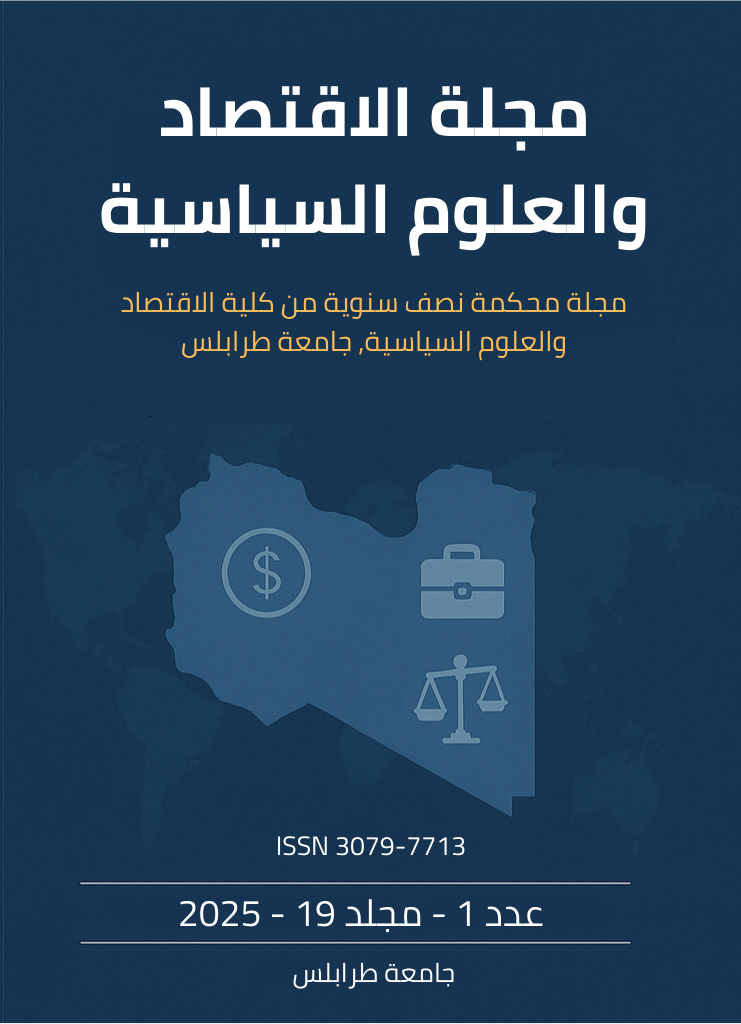ال دمج الإيكوفيمينيزم ونظرية الباناركي: تحويل نظرية الإدارة لتحقيق الحوكمة البيئية المستدامة في ليبيا
الكلمات المفتاحية:
الإيكوفيمينيزم، الباناركي، الاستدامة البيئية، نظرية الإدارة، المساواة الجندريةالملخص
تتناول هذه الدراسة بشكل نقدي دور نظرية وممارسات الإدارة في تفاقم الأزمات البيئية في عصر الأنثروبوسين، مع التركيز تحديدًا على التحديات البيئية في ليبيا، بما في ذلك تلوث النفط، ندرة المياه، والتصحر. من خلال دمج وجهات النظر الإيكوفيمينية، يناقش البحث الاضطهاد المترابط للنساء وتدهور البيئة، مع تسليط الضوء على المساهمات الحيوية للنساء في إدارة الموارد المستدامة وتعزيز مرونة المجتمعات. تم استخدام منهجية مراجعة مفاهيمية شاملة، جمعت بين الأدبيات من المجلات المحكمة، الكتب، والدراسات الحديثة (2020-2024) لتوسيع نموذج التمايز الباراديغمي لبوريل ومورغان (1979). يكشف التحليل أن النماذج التقليدية للإدارة، التي تتسم بالممارسات الأنثروبوسينية والاستخراجية، تعجز عن استيعاب التفاعلات المعقدة ومتعددة المستويات في النظم البيئية والاجتماعية في ليبيا. بدلاً من ذلك، يوفر تبني إطار الباناركي جنبًا إلى جنب مع الإيكوفيمينيزم نهجًا أكثر شمولًا ومرونة للحوكمة البيئية.
تشير النتائج إلى أن دمج المبادئ الحساسة للنوع الاجتماعي والمبنية على القيم البيئية في نظريات الإدارة يعزز من قدرة المنظمات على التكيف والاستدامة، لا سيما في ليبيا، حيث تلعب النساء دورًا أساسيًا في المبادرات البيئية المجتمعية وجهود الحفظ القائمة على المجتمعات المحلية. تسهم هذه الدراسة في الأدبيات من خلال اقتراح نموذج باراديغمي جديد يقوم على نظام الباناركي البيئي، يدمج نظرية الإدارة مع الاعتبارات البيئية والجندرية، ويدعو إلى تحول منهجي نحو ممارسات بيئية مستدامة وعادلة. يجب أن تستكشف البحوث المستقبلية استراتيجيات عملية لتطبيق نظام الباناركي البيئي والتحقيق بشكل أعمق في دمج المبادئ الإيكوفيمينية في سياقات اجتماعية وثقافية متنوعة لتعزيز المرونة البيئية على المستوى العالمي.
الكلمات المفتاحية: الإيكوفيمينيزم، الباناركي، الاستدامة البيئية، نظرية الإدارة، المساواة الجندرية، الحوكمة البيئية في ليبيا.

التنزيلات
منشور
كيفية الاقتباس
إصدار
القسم
الرخصة
الحقوق الفكرية (c) 2025 مجلة الاقتصاد والعلوم السياسية

هذا العمل مرخص بموجب Creative Commons Attribution 4.0 International License.
1- يقدم الباحث تعهداً ( حسب النموذج المعد لذلك ) يفيد بأن الإنتاج العلمي المقدم لغرض النشر في المجلة لم يسبق نشره بأي صورة ، وأنه غير مقدم للنشر لأي جهة أخرى ،وأنه ليس ملخصاً لأي إنتاج علمي سبق نشره .
2- يخضع كل الإنتاج العلمي المقدم لغرض النشر في المجلة لبرنامج (Software) معتمد لغرض الكشف عن أية مخالفات لقوانين الملكية الفكرية ( السرقة الأدبية ) ( PLAGIARISM) للتأكد من أمانته العلمية .
3- في حالة ثبوت أية مخالفات لقوانين الملكية الفكرية يمنع الإنتاج العلمي من النشر في المجلة بشكل نهائي.
4- يقدم الإنتاج العلمي في ثلاثة نسخ ورقية (Hardcopy) على مقاس ( A4 ) ، بالإضافة إلى نسخة واحدة على قرص مدمج ( CD ) مكتوباً ببرنامج ( Word ) تحت نظام التشغيل ( Windows).
5- لهيئة التحرير حق الفحص المبدئي للإنتاج العلمي المقدم للنشر وتقرير أهليته للتحكيم أو رفضه .
6- لهيئة التحرير حق طلب أي مستندات تراها ضرورية لإتمام عملية الفحص المبدئي أو التحكيم ، على سبيل المثال لأ الحصر : ( نماذج تحليل البيانات الإحصائية – صحائف الاستبانة المملؤة من قبل المستجوبين – التقارير .. الخ )
7- تعبئة نموذج التعارف الخاص بالمجلة الذي يحتوي على بعض البيانات الضرورية للاتصال بالباحث .
8-تكون فترة استلام الإنتاج العلمي من قبل الباحثين حسب المدة المذكورة في إعلان فتح قبول الإنتاج العلمي للنشر في المجلة .
9- يتم استلام الإنتاج لغرض نشره في المجلة عن طريق اليد أو عن طريق البريد الالكتروني للمجلة .
10-تعطي الأولوية في النشر للإنتاج العلمي التطبيقي ( العملي ) ، كما تعطي الأولوية أيضا للإنتاج العملي الذي يعالج مشاكل قائمة تمس ليبيا .
11 –يخضع ترتيب الإنتاج العلمي للنشر في المجلة تبعاً لاعتبارات فنية تحدد من قبل هيئة التحرير .
12 – كل الآراء الواردة في الإنتاج العلمي تعبر عن أصحابها فقط ، ولا تعبر بالضرورة عن رأي المجلة .
##plugins.generic.dates.accepted## 2025-04-07
##plugins.generic.dates.published## 2025-05-27










